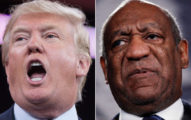The most telling moment of the third and final presidential debate on Oct. 19, 2016 came in its final moments. Moderator Chris Wallace, in front of a restrained crowd at the University of Nevada Las Vegas, turned to Trump and asked a devastating question.
“In the last debate,” Wallace said, “you were we were both asked about the situation in the Syrian city of Aleppo. I want to follow up on that because you said several things in that debate which were not true.”
Wallace barely had the question out before Trump started interrupting him. Trump called Aleppo a catastrophe, asked Wallace if he had seen Aleppo and betrayed his own deep ignorance of world affairs.
“You also said that Syria and Russia are busy fighting ISIS,” Wallace said amid interruptions. “In fact, they have been the ones who have been bombing and shelling eastern Aleppo and they just announced a humanitarian pause, in effect admitting that they have been bombing and shelling Aleppo.”
Then Wallace rhetorically stabbed Trump in the jugular. “Would you like to clear that up, sir?”
“Aleppo is a disaster,” Trump said. “It is a humanitarian nightmare, but it has fallen from any standpoint. I mean what do you need, a signed document?”
Aleppo hasn’t fallen. It’s a divided city — and it’s been a divided city for years now. People fight and live there, a quarter million of them. The United Nations warned the day before the debate that the world needs to do something to save Aleppo. That’s not a city that’s fallen, that’s a city in trouble. And a big difference the Trump is apparently incapable of understanding.
Wallace kicked the question over to his Democratic rival Hillary Clinton, who delivered a well-reasoned response involving no-fly zones, safe-zones and leverage over Russia. It was the exact same plan she’d explained during the second presidential debate. She’s consistent that way.
Trump lost the third debate and he lost it hard. He doubled down on ignorance, showed he would never change and, every chance he got, pointed to Clinton as the source of America’s ills. It was a bad strategy. The longer he pointed at her, the better she looked.
Earlier in the debate, Clinton accused Trump of wanting to tear up America’s alliances. Trump reeled.
“All I said was we have to renegotiate these agreements because our country cannot afford to defend Saudi Arabia, Japan, Germany, South Korea and many other places,” Trump said.
Trump insisted that his stated desire to dismantle NATO had compelled NATO to start paying the United States … protection money, or something — the Republican candidate was never quite clear on what he meant by “pay.”
“I’ve been given a lot of credit for it and all the sudden they are starting to pay up,” Trump rambled. “We are protecting people, they have to pay up — and I’m a big fan of NATO, but they have to pay up.”
Trump deeply misunderstands both NATO and the nature of America’s alliances with, at the very least, Japan and South Korea. The Republican standard-bearer makes it seem as if America is footing the bill for smaller countries to be part of NATO.
In reality, member states pledge to spend two percent of their GDP on defense. The United States and just four of NATO’s other 27 members actually meet that standard. The median military budget for NATO governments is 1.18 percent of GDP.
America does spend a lot of money in order to play the leading role that it does within NATO, but so does France, the United Kingdom and Germany. The rich countries help out the poor countries. What they don’t do is kick out the poorer members. That would weaken the entire enterprise.
Tokyo and Seoul might also take issue with Trump’s characterization of them as recipients of American largess. American troops reside at bases in Japan that Japan pays to maintain. Last year these bases cost the Japanese around $2 billion. South Korea pays more than $800 million annually to keep the Americans around.
That’s hardly nothing.
